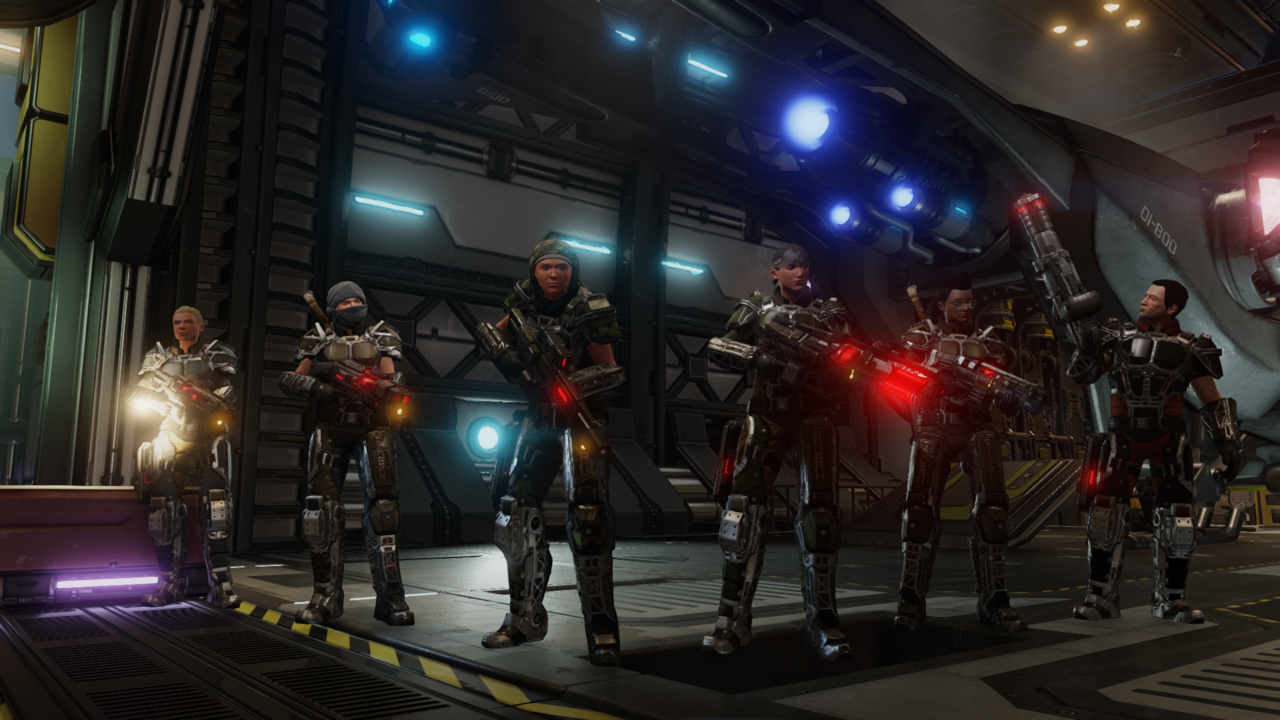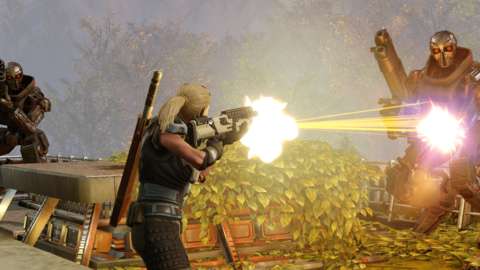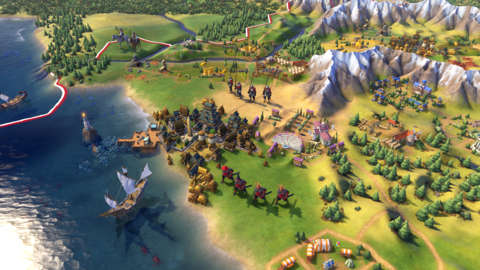As Mass Effect: Andromeda recently showed, even games with massive budgets, schedules, and teams can sometimes come up short. According to XCOM Lead Jake Solomon--a man whose own forays into triple-A development have produced highly successful games like XCOM 2--that's not too surprising.
In a talk Solomon gave last month at PAX East, he explained that failure is as much a tool as it is a stumbling block, that the lessons we learn from it outweigh the toll it takes. In the world of triple-A game development, however, it can still be a liability. We recently caught up with Solomon to take a peek inside his high-stakes world in hopes of better understanding the people and processes behind some of our favorite games.

GameSpot: I wanted to start with something that you spoke about in your speech last month. One of the subjects you touched on was failure and how it's an important step in building toward success.
Solomon: Absolutely.
So my question is, do you think that triple-A development currently leaves room for failure? Is there time and money for people to iterate and experiment and fail on their way to creating something great?
Yes, I think so, but even in triple-A, the absolute top, most developers […] have some types of constraints and schedule and things like that, which of course makes sense. I think that there is an opportunity for failure, but I think […] the reaches that you take have to be planned to where anything you're innovating on, you have to plan for that type of failure in the schedule.
With sequels, typically, you don't have to reach as far. I think the real challenge is when you're either making something new or rebooting something. Just by the nature of it, you're going to have to take some really creatively risky reaches, attempts at things, and so when you do that, there's guaranteed to be big failures along the way. I think that the challenge is, I guess, having enough time.
But in terms of the industry as a whole, it's a tightrope. It is an absolute tightrope, I think because triple-A games are so hit driven. It's an interesting thing to think about. In this industry, I think your first failure is probably going to be your last one, too.
It certainly seems that way, yes.
It wasn't that way a while ago, but it's just the nature of [the industry]. And it makes total sense. There's nothing wrong with that. I think that if you're talking about tens of millions of dollars to make games, if you're talking about margins like that, then yeah, it's hard to recover from that.
"In this industry, I think your first failure is probably going to be your last one, too." -- Jake Solomon
You have to take risks, you have to innovate, otherwise you're not offering value and people will find it somewhere else. At the same time, those risks could sink you if you don't fail fast enough and get to the actual right answer, so I think it really is kind of a tightrope.
I think it's why people in my position typically don't stay relevant for that long. It doesn't bother me to say because it's just a fact. There are some people who stay at the absolute top of the game for a long time. Todd Howard's been making games for a long time, but you can think of any name from 10 years ago and you could say, "Oh yeah, they're not as big as they were 10 years ago, so in 10 years, what does that mean for me? What does that mean for a lot of people in my position?"
This word is going to sound harsh, but that almost makes developers sound disposable, to an extent. Is that true, and if so, how do you escape that mindset? How do you go into a project knowing, "Maybe this will be my last one; maybe I won't matter after this"?
I think that that is always my mindset. It's the sort of thing that I keep very, very present. It does not make for a really relaxed thought process, but it's something that I always try to keep present in my mind: the thought that when you're creating things, you're basically pulling ideas out of thin air. The only way you can offer value to people is coming up with something new.
When you try to come up with something new, failure is a big part of that, and so that means failure is a very big part of what I do. And so there's a very good chance that my failure could end up becoming big enough that maybe a game is my last game, for a long time or forever.

I don't know if developers are disposable so much as... It's like any business, basically, except that ours has a lot of turn over, really quick, and I think it's because our industry's still kind of in the early stages. We're still trying to find out what it is that provides the most value to players. I think that you just have to keep in mind that if you don't innovate, somebody else will, so you have to taking those risks, knowing that inherent in those risks, potentially, is your failure as well.
That's why I think you just can't dwell on failure. You have to fail efficiently, and that means that you can't dwell on failure as a personal thing. You can't dwell on it as an emotional thing. You have to be very cold-blooded about it and say, "We are going to fail. I'm going to fail." The key is to fail efficiently. When we fail, look at it right in the eyes and say, "What did that teach us?" And we very quickly need to get onto our next failure because we've got to get through these failures until, all of a sudden, we have something that we say, "Okay, this is good enough."
The scary part is that you can never predict. Eventually I think, as a designer, you have this sense of, "This will work out at some point," but you don't know how many failures that's going to take, and you only have so much runway. So it is kind of terrifying when you're in the middle of the process and you're like, "This is not good. This feature's not good, but it must be good," and you're like, "We've just got to get through. We've got to keep trying to find the right way."
To circle back to something you mentioned a little while ago, it seems like, ultimately, what raises the stakes, what makes failure such a potential liability for a developer, is money, really. It's an economic question. Like you said, you're investing tens of millions of dollars into a game. From an economic standpoint, it's hard to question publishers' need for guarantees.
Not at all.
The question is, what does that money actually allow you to do as a developer? Is that trade-off worth it? Is raising the stakes to that degree worth that kind of monetary investment?
It's kind of an industry question. Whatever game you're making has to have the audience to support your investment, obviously. Certain games have massive audiences, and so that means that they can support [bigger budgets]. I'm more of a standard developer. We have limits on what we do, and we have to be efficient with what we do, and we have to think about, "Is this really going to provide value to our audience? Should we really be doing this, because it's eating up time?"
I think that you rise to, basically, a breaking point. This is just industry wide. Everything has changed so much. When I started, something like Civilization III, it probably sold a couple million copies or something like that, but it cost nothing to make. But then eventually, a certain standard of quality is expected and your teams get larger and they continue to get larger and the quality of titles continues to be expected to go up, and all of that means that as the cost of development's going up, you either have to increase the revenue [or] increase your audience. It's all a question of which game you're making, because your return does justify the investment--and if it didn't, it'll be the last time you do it.
"The only way you can offer value to people is coming up with something new. When you try to come up with something new, failure is a big part of that." -- Jake Solomon
It's interesting because the return on hits are so big that you can certainly understand why people want to make these big, big games. I don't know what the return on Call of Duty is, but I'm sure it's really f**king great, so you certainly understand why people would want to make games like that. There are so many other games that exist in the middle. I was talking to a designer who's a really good friend of mine. He's more of an indie developer. I said, "How you guys doing?" He said, "Well, if we sold half of what we sold we'd be out of business. If we sold twice what we sold we'd be rich." And I'm like, "You basically just described all of us."
I think that holds for most people and the vast majority of game development. And so the tension, obviously, on the business side comes from rising costs and how can you recoup that. Because you can't just sit there and costs can't continue to rise if you're not also increasing your audience or revenue. Business is a really big part of what we do. It's just not something we talk about because most people find it dry, I suppose.
It's inescapable, though. Games are a business. And to hear you talk about it, it almost sounds like game development is somewhere between an arms race and a gold rush. Is the current system sustainable? Where does this end?
The industry is so varied now; even indie games have a really high level of polish now. I think the problem is that, every time you make a game, you have to look at [all these different games] and say, "Wow, they did this thing, and wow, they did that thing," and then there are all these reasons you're like, "Yeah, we could 20 more people to do all these neat things," and then you have to balance that against, "Okay, is that really going to be worth it?"
I'd love to try making a game where it doesn't f**king matter and I can be like, "You know what? I want to add this feature and this feature and this feature." But a lot of us have to think in terms of, "This is the most valuable feature to our audience. This is what they love, so this is what we're going to focus on. We can't just throw everything in there."
You have to be real smart about that, and obviously, that's another place where you can't make mistakes. You can't say, "The big feature for this next game is X," and if your audience is like, "We don't give a shit about X," then you're like, "Oh s**t" because we spent a lot of money making that.

Do you have a project or an idea that you would pursue if you didn't have to worry about money from publishers or even fan expectations?
Whenever I see people designing space sims and things like that, I'm like, "That sounds like so much fun." I think the best sim that's ever been made is Minecraft. Minecraft is so simple, but it feels so real. It feels so authentic, which is its power. I just think Minecraft is amazing, and I never would've been able to come up with an idea like that because I tend to think in incredibly complex simulations type stuff.
That would probably be the thing I'd work on. I joke about that, even with other developers I joke. That's what I would do. The kind of person I am, I would be happy spending 20 years working on some obscenely complicated universe simulation and then never release it, probably, and go f**king crazy by the end. I'd be the guy with the hair, pissing in bottles, telling people, "Er, go away. I'm working on the space simulation." There'd be websites about "Whatever happened to Jake Solomon?"
So what you're saying is, you're not going to make a space sim?
No, no. I'm not going to because I don't want to go crazy.
Your most recent game, XCOM 2, is a strategy game. Strategy's not really known for being a big triple-A seller. How do you approach making a triple-A strategy game knowing that it's not traditionally a high-selling genre?
XCOM would never exist without Civilization, because Civ is the proof. They're a very non-standard triple-A game, but they do amazingly, amazingly well because they have a loyal audience. I think that's what's important about strategy, and that's why I like making strategy games. Not only because I love strategy, but we have a relationship with our audience and it's probably more important to us than a lot of other titles.
Having a very distinct, loyal audience makes it easier as a developer to focus on, "Okay, this is what they like. This is what our relationship's like," and you get to a point where, when you're making Civ or when you're making XCOM and you're making sequels, the ownership shifts from me as a designer.

When you make your first game, you feel like you have creative ownership over it. When you make games that have an audience already, then you shift the ownership over to your audience. And now you're in a position where you're sort of curating this game for your audience, and you can have this back and forth with them in terms of understanding what it is they want. I think that that's how you have to approach a game like XCOM, or even a game like Civ--you feel like you have this shared ownership.
At the end of the day, whose opinion about what happens in the game is more important: the fans or the developers?
Unquestionably the fans, unquestionably. I always, always say that our players' values are our values. They have to be. I always have to project players' values onto my own, and when I'm designing a feature I have to try and say, "This is something they're going to appreciate or they're going to like," because if I don't, if I'm off this way, then the problem is, I'm going to have to readjust. It's not like the players are going to readjust what they like based on what I've said.
For a specific example, in XCOM 2, a lot of the missions are timed--like, you have to complete this mission in this many turns. And I did that because I was just thinking, "Okay, objectively, that's a better design because it forces players to make sub-optimal decisions. They don't have all the time in the world, so now they have to take risks." The good thing about that is that when players take risks, they have varied experiences from mission to mission. There's no optimal way to solve a mission. You can't just sit back and be real defensive.
The problem is, some players didn't like that kind of pressure on them, and it's not for me to then defend my design decisions. Another death trap for designers is to say, "Let me explain to you why I'm right and you're wrong." Instead, the goal is to say, "Okay, if that's what my players' values are, I need to readjust." It's one of the hardest things, but I really have to force myself to say, "I need to find a way to make this work with my players' values, not my own particular opinion about what's the best design."
At the same time, though, most fans are not developers. They don't necessarily know what's going to work in the context of the game. So if you're turning creative control over to people who don't know how to make games, could you ultimately end up with something that doesn't work or make sense?
Oh yeah, [but] I think the mechanics are up to the designer. It's more the broad strokes of, if the players don't like something, you're like, "Okay, well this is what I want to achieve, but if they didn't like this mechanic, I need to come up with another mechanic." Again, you just have to make sure your values are aligned with your players.
"I always, always say that our players' values are our values. They have to be." -- Jake Solomon
Again, it goes back even to the thought of money and development. The only things that matters are the things that bring players value. It's like if an artist was modeling a table and they spend a s**t load of time modeling the underside of the table and the player never sees the table. All that time is just money poured down a hole. That's the kind of thing we have to be careful about. Because if you're doing that, you're just wasting time. They'll never see it. They'll never care.
The only way to get around it is to make sure you understand your players' values well enough to say, "You know what? We shouldn't waste time on that. They're not going to give a s**t. We shouldn't worry about that. We should worry about this thing that they really care about, that they spend a lot of time on." That's why understanding your players is so, so important.

